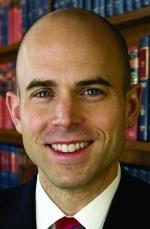Edward R. Morrison, Renowned Scholar of Bankruptcy Law and Economist, Returns to Columbia Law School
Morrison's Body of Work Includes Empirical and Theoretical Contributions to Understanding the Causes and Consequences of Corporate and Consumer Insolvency
New York, March 19, 2014—Edward R. Morrison, one of the country’s foremost scholars of bankruptcy law and law and economics, will return to Columbia Law School in July 2014.
Morrison first joined the Columbia Law School faculty in 2003 and served as the Harvey R. Miller Professor of Law and Economics from 2009 to 2012. He was also co-director of the Richard Paul Richman Center for Business, Law, and Public Policy at Columbia University, an interdisciplinary hub established in 2011 to examine issues at the intersection of business and law.
| Edward R. Morrison |
Morrison’s research explores the causes and consequences of insolvency, both consumer and corporate. Over the course of a distinguished career, his scholarship has addressed corporate reorganization, consumer bankruptcy, entrepreneurship and small business finance, financial derivatives, the regulation of systemic market risk, and foreclosure and mortgage modification. He has conducted rigorous and empirical economic research into bankruptcy, earning recognition from both the bankruptcy bench and bar. He is a conferee of the National Bankruptcy Conference and has been appointed by Chief Justice John G. Roberts, Jr. to serve as a member of the Advisory Committee on Bankruptcy Rules.
In 2012, Morrison joined the law faculty of the University of Chicago, where he earned his J.D., as well as a master’s and Ph.D. in economics. While serving as Chicago’s Paul H. and Theo Leffmann Professor of Commercial Law, Morrison continued collaborating with colleagues at Columbia Business School on a paper forthcoming in the American Economic Review, “Mortgage Modification and Strategic Default: Evidence from a Legal Settlement with Countrywide.”
"Ed has an unwavering commitment to illuminating the facts of complex commercial relationships,” said Columbia Law School Dean David M. Schizer. “Columbia is the ideal place for this sort of work."
Morrison’s current work studies patterns in inter-creditor agreements, the extent to which unexpected health expenditures cause defaults and consumer bankruptcy filings, the effects of bankruptcy law on entrepreneurship, and the costs and benefits of the bankruptcy code’s special rules for financial contracts such as repos.
Morrison is the editor of a new book, Economics of Bankruptcy (Edward Elgar Press 2012), that integrates corporate finance and bankruptcy law through a collection of seminal contributions to the economic literature on bankruptcy. His work has appeared in a range of academic journals, from the Journal of Law & Economics and Journal of Legal Analysis to the Columbia Law Review and Yale Journal on Regulation.His research has attracted support from the National Science Foundation and Pew Charitable Trusts.
In 2012, Morrison received the John Wesley Steen Law Review Writing Prize from the American Bankruptcy Institute (ABI), along with Douglas Baird of the University of Chicago, for an article on the Dodd-Frank Act published in the ABI Law Review.
Morrison is currently an editor of the Journal of Legal Studies and was previously an associate editor of the American Law & Economics Review. He now serves as a director of the American Law & Economics Association.
Morrison graduated summa cum laude from the University of Utah before his studies at Chicago. He clerked for Judge Antonin Scalia of the Supreme Court of the United States and for Judge Richard A. Posner of the 7th Circuit Court of Appeals.
